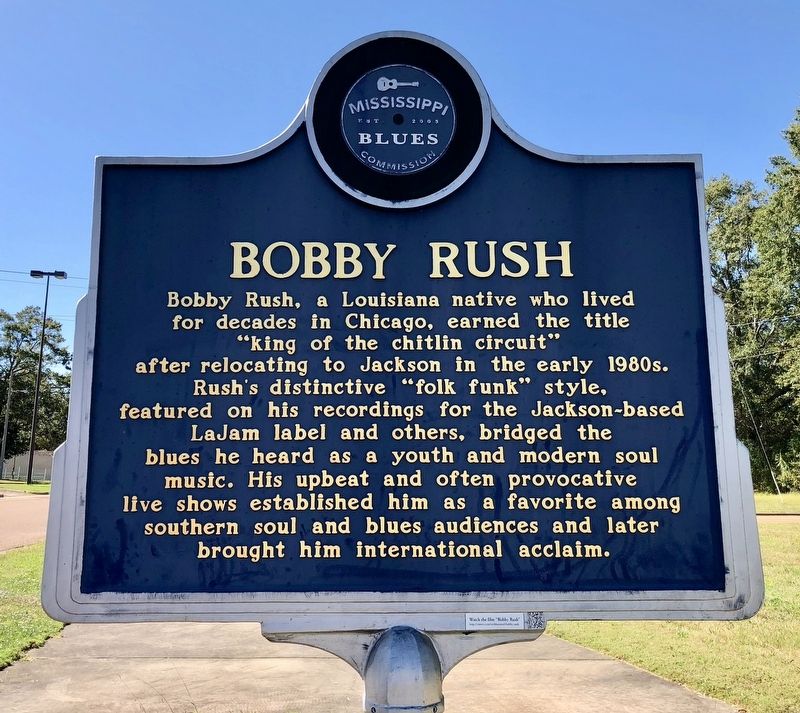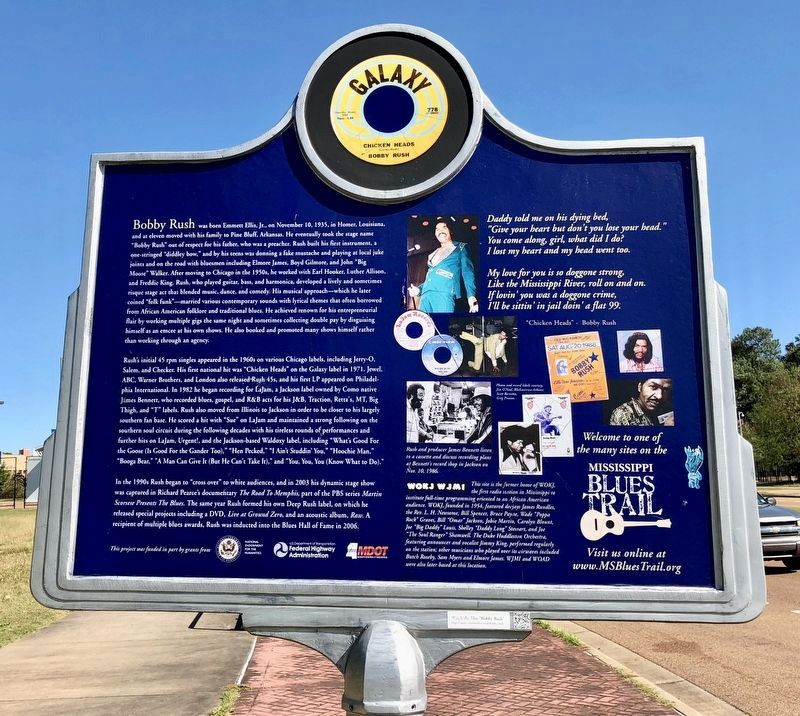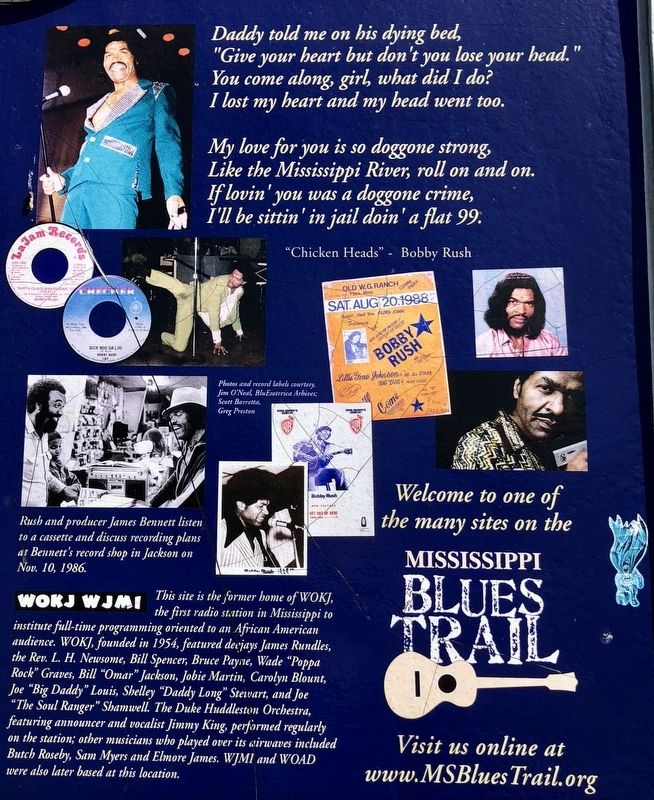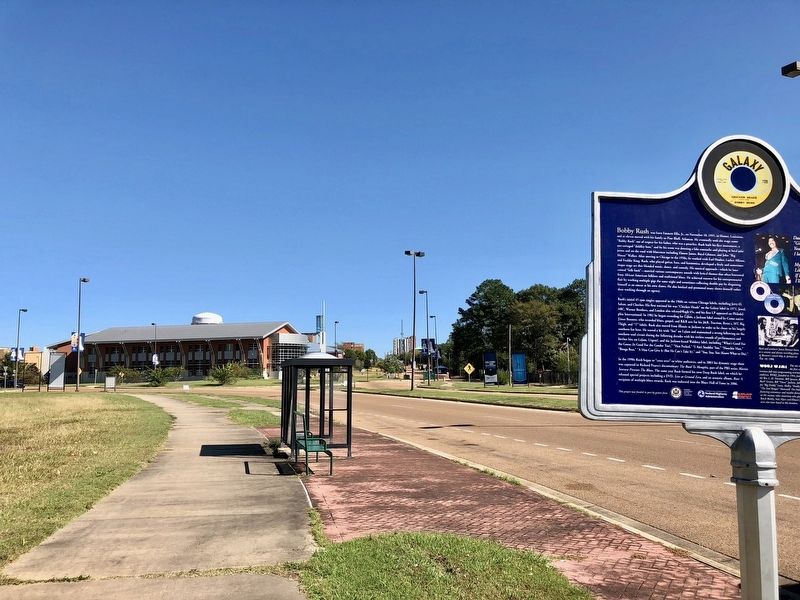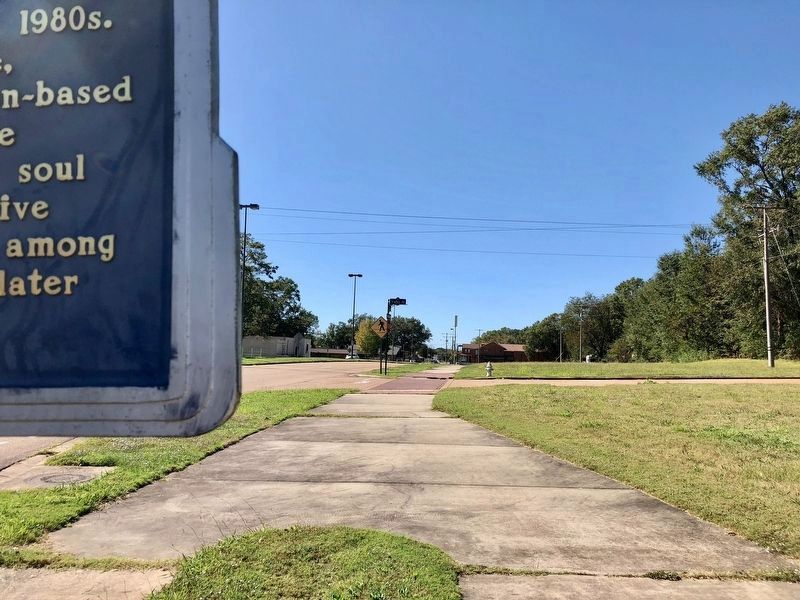Washington Addition in Jackson in Hinds County, Mississippi — The American South (East South Central)
Bobby Rush
Front
Bobby Rush, a Louisiana native who lived for decades in Chicago, earned the title “king of the chitlin circuit” after relocating to Jackson in the early 1980s. Rush's distinctive “folk funk” style, featured on his recordings for the Jackson-based LaJam label and others, bridged the blues he heard as a youth and modern soul music. His upbeat and often provocative live shows established him as a favorite among southern soul and blues audiences and later brought him international acclaim.
Rear
Bobby Rush was born Emmett Ellis, Jr., on November 10, 1937 (although he has claimed birthdates before and after that date) in Homer, Louisiana, and at eleven moved with his family to Pine Bluff, Arkansas. He eventually took the stage name “Bobby Rush” out of respect for his father, who was a preacher. Rush built his first instrument, a one-stringed “diddley bow,” and by his teens was donning a fake mustache and playing at local juke joints and on the road with bluesmen including Elmore James, Boyd Gilmore, and John “Big Moose” Walker. After moving to Chicago in the 1950s, he worked with Earl Hooker, Luther Allison, and Freddie King. Rush, who played guitar, bass, and harmonica, developed a lively and sometimes risque stage act that blended music, dance, and comedy. His musical approach—which he later coined “folk funk”—married various contemporary sounds with lyrical themes that often borrowed from African American folklore and traditional blues. He achieved renown for his entrepreneurial flair by working multiple gigs the same night and sometimes collecting double pay by disguising himself as an emcee at his own shows. He also booked and promoted many shows himself rather than working through an agency.
Rush’s initial 45 rpm singles appeared in the 1960s on various Chicago labels, including Jerry-O, Salem, and Checker. His first national hit was “Chicken Heads” on the Galaxy label in 1971. Jewel, ABC, Warner Brothers, and London also released Rush 45s, and his first LP appeared on Philadelphia International. In 1982 he began recording for LaJam, a Jackson label owned by Como native James Bennett, who recorded blues, gospel, and R&B acts for his J&B, Traction, Retta's, MT, Big Thigh, and “T” labels. Rush also moved from Illinois to Jackson in order to be closer to his largely southern fan base. He scored a hit with “Sue” on LaJam and maintained a strong following on the southern soul circuit during the following decades with his tireless rounds of performances and further hits on LaJam, Urgent!, and the Jackson-based Waldoxy label, including “What’s Good For the Goose (Is Good For the Gander Too),” “Hen Pecked,” “I Ain’t Studdin’ You,” “Hoochie Man,” “Booga Bear," "A Man Can Give It (But He Can't Take It)," and "You, You, You (Know What to Do)."
In the 1990s Rush began to “cross over” to white audiences, and in 2003 his dynamic stage show was captured in Richard Pearce’s documentary The Road To Memphis, part of the PBS series Martin Scorsese Presents The Blues. The same year Rush formed his own Deep Rush label, on which he released special projects including a DVD, Live at Ground Zero, and an acoustic album, Raw. A recipient of multiple blues awards, Rush was inducted into the Blues Hall of Fame in 2006. He won a GRAMMY® in 2017 for Best Traditional Blues Album for Porcupine Meat.
Erected 2008 by the Mississippi Blues Commission. (Marker Number 57.)
Topics and series. This historical marker is listed in these topic lists: African Americans • Arts, Letters, Music • Entertainment. In addition, it is included in the Grammy Award Winners, and the Mississippi Blues Trail series lists. A significant historical date for this entry is November 10, 1937.
Location. 32° 17.869′ N, 90° 12.937′ W. Marker is in Jackson
, Mississippi, in Hinds County. It is in Washington Addition. Marker is at the intersection of John R. Lynch Street and Valley Street, on the right when traveling west on John R. Lynch Street. Touch for map. Marker is at or near this postal address: 1825 John R Lynch Street, Jackson MS 39203, United States of America. Touch for directions.
Other nearby markers. At least 8 other markers are within walking distance of this marker. The Gowdy Community (within shouting distance of this marker); Jackson State Tragedy (approx. 0.2 miles away); Dorothy Moore (approx. 0.3 miles away); a different marker also named Jackson State Tragedy (approx. half a mile away); Margaret Walker (approx. half a mile away); A Bench By The Road (approx. half a mile away); Ishmon Bracey (approx. 0.6 miles away); Greater Mt. Calvary Chapel (approx. 0.7 miles away). Touch for a list and map of all markers in Jackson.
Also see . . . Wikipedia article on Bobby Rush (born Emmett Ellis, Jr.). (Submitted on October 27, 2017, by Mark Hilton of Montgomery, Alabama.)
Credits. This page was last revised on February 16, 2023. It was originally submitted on October 27, 2017, by Mark Hilton of Montgomery, Alabama. This page has been viewed 289 times since then and 22 times this year. Photos: 1, 2, 3, 4, 5. submitted on October 27, 2017, by Mark Hilton of Montgomery, Alabama.
